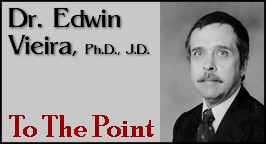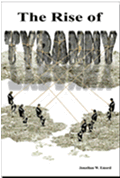THOUGHTS
ON PART THREE OF “A CONCURRING OPINION”
PART 3
By
Dr. Edwin Vieira, Jr., Ph.D., J.D.
March 3, 2010
NewsWithViews.com
It is somewhat difficult for me to respond to Timothy Baldwin’s “A CONCURRING OPINION FOR SECESSION (Part 3)”, because Mr. Baldwin focuses on various generalities that skirt the issue of whether “secession” is legitimate under the specific terms of the Constitution of the United States, not simply under amorphous “political maxims”.
1. Mr. Baldwin sets up as his target what he calls “Anti-Secessionist Argument #2: The US Constitution is not a Federal Compact of States/Bodies-Politic, but Is an Independent Government Formed by One People/Body-Politic, Without Regard to State Powers”. Now, it is fairly obvious that part of this contention is true: namely, that the General Government certainly is an “independent government”, in the sense that it does not require the assent of each State, or of every State, or of any particular number of States in order to enact legislation that is binding on individuals who reside within the States, and in some cases even on the States themselves. See, e.g., U.S. Const. Article VI, cls. 2 and 3, and Article I, § 10, cls. 2 and 3. On the other hand, Mr. Baldwin’s statement of the argument sets up something of a straw-man, because I doubt that any “anti-secessionist” who is also a constitutionalist believes that the General Government was created, or can operate today, “without regard to State powers”. See, e.g., U.S. Const. Amendment X. Moreover, for the purposes of this discussion I am perfectly willing to accept that the Constitution is “a federal compact of States” which, to some degree, must be construed according to the general principles of “contracts”. My point is that the substance of this “contract” must be determined by examining the actual language of the “contract” itself, and what that language means to any reasonable person according to the “objective” theory of interpretation, not by reliance on various individuals’ opinions about what the language should mean according to their idiosyncratic understanding of “political maxims”.
2. Mr. Baldwin argues that “if in fact the constitution is a federal compact assented to by the states in their individual and independent capacity as a sovereign state, then political maxims held true in American jurisprudence prove that those states may secede from the union in like manner that they entered: through the UNILATERAL action of that body-politic”. The truth of this assertion, however, depends, not on the mere name “federal compact” that can be applied to the Constitution, but instead on what in substance this “compact” actually provides. People (and bodies politic) do enter into “contracts” “through the[ir] UNILATERAL action”; but they cannot lawfully “secede” from “contracts” in that manner, unless the “contracts” specifically sanction such “secession”. This includes the States. See U.S. Const. Article I, § 10, cl. 1 (“[n]o State shall * * * pass any * * * Law impairing the Obligation of Contracts”, which has been held to apply to a State’s own “Contracts”).
It is certainly possible that a “federal compact” could provide for “unilateral secession”, or for “no secession at all”, or for “secession according only to specific procedures set out in the compact”. Indeed, the third of these possibilities is precisely what the Articles of Confederation explicitly did provide in Article XIII. So, were the Articles of Confederation not “a federal compact assented to by the states in their individual and independent capacity as a sovereign state”? Or, if the Articles were such a “compact”, then is not Mr. Baldwin’s general assertion proven wrong by the very predecessor of the Constitution, “assented to by the [very same] states in their individual and independent capacity” that then “assented” to the Constitution? And, if so, must not the Constitution be construed according to the selfsame principles—that is, with specific reference to and objective interpretation of its own terms, not just according to mere “political maxims”? Or are the plain terms of Article XIII of the Articles—and, presumably, the plain terms of the Constitution, too—to be overridden by these “maxims”? In which case, are we to treat these “maxims” as “the supreme Law of the Land”, in defiance of the Constitution? See Article VI, cl. 2.
3. Mr. Baldwin contends that “[t]he question should be this: was the US Constitution formed by the people of states as an individual body-politic, or was it formed by the people as one body-politic?” But does the legality of “secession” under the Constitution really depend upon a definitive answer to this question? That is, whoever formed the Constitution, could it not have provided for “unilateral secession”, or for “no secession at all”, or for “secession according only to specific procedures set out in the compact”? On precisely what basis should we conclude that the issue of “secession” under the Constitution must be settled merely by identifying the authors of the document, and not by studying its actual terms? Did “the people of states as an individual body-politic” have any less discretion as to that matter than “the people as one body-politic” (or vice-versa)?
4. Mr. Baldwin states a “conclusion” with which, for purposes of argument in this discussion, I shall agree: namely, “the US Constitution was formed, NOT by one body-politic of the American nation, but rather, the US Constitution was formed by individual, several and separate bodies-politic of states through their ASSENT in the form of a FEDERAL COMPACT”. Even if true, however, this does not settle the issue of what that “FEDERAL COMPACT” actually provides with respect to “secession”, because no one can doubt that “individual, several and separate bodies-politic of states” could agree through “compact” (or “contract”, or “agreement”, or under whatever other rubric one may like) to whatever terms they desired with respect to “secession” from the “compact”. Mr. Baldwin’s burden is to prove, not simply that the Constitution is “a FEDERAL COMPACT”, but that it is a “federal compact” of a very specific kind with respect to “secession”.
It is not enough for Mr. Baldwin to argue that “were it accepted that the US Constitution was in fact a federal compact created by the assent of sovereign states, then the resulting conclusion would confirm that those states have the right to secede from the compact thus formed, as expressed by the expounders of the Law of Nations”. For it is simply not true that in the late 1700s the Law of Nations absolutely precluded the possibility of “a federal compact created by the assent of sovereign states” that prohibited “secession” at all, or that allowed “secession” only according to some special procedure. (Or was Article XIII of the Articles of Confederation in violation of the Law of Nations?) And even if that had been the view of every last one of Mr. Baldwin’s “expounders” of the Law of Nations at that time, nothing could have prevented the sovereign people of the several States from confounding those “expounders” by creating an entirely new form of “federal compact” with respect to “secession”. Those unnamed “expounders”, after all, were not the authors of the Constitution. And did not the Declaration of Independence assert, on behalf of “the good People of these Colonies”, the people’s absolute right to form a new government on principles of their own choosing: namely, that “whenever any Form of Government becomes destructive of [men’s unalienable rights], it is the Right of the People to alter and abolish it, and to institute new Government, laying its foundation on such principles and organizing its powers in such form, as to them shall seem most likely to effect their Safety and Happiness” (emphasis supplied)? Why could “the good People” of the independent States not have “organiz[ed the] powers [of ‘secession’]” in a form unknown to the old “expounders” of the Law of Nations? And, if they did, where would the evidence of their decision to do so be found, other than in the terms of the Constitution itself? (I leave aside the rather extensive problem of whether the “expounders” of the Law of Nations that Mr. Baldwin has in mind were correct in their exposition of that law as to “secession”, because I believe that the Declaration of Independence renders the views of these and all other such “expounders” beside the point in any event.)
5. So, it begs the question for Mr. Baldwin to point out—although he does so correctly, I believe, in terms of the procedure the Founders followed—that “[i]n truth, every aspect of the ratification of the US Constitution was federal in nature, meaning formed by independent and sovereign states”. For that “federal” method of forming the Union was not necessarily inconsistent with the Union’s disallowing “secession” unless under some specific procedure set out in the very document establishing the Union. Rather, Mr. Baldwin must prove that it was impossible in principle, as a matter of law, for “independent and sovereign states” in the late 1700s to enter into a “compact” or “contract” so providing as to “secession”; or, that if it was not impossible in principle for “independent and sovereign states” to enter into such a “compact”, then in fact the Constitution cannot possibly be construed so to provide.
| Subscribe to the NewsWithViews Daily News Alerts! |
Now, inasmuch as Article V of the Constitution can be construed as a perfectly adequate procedure for “secession” (even though not as broad as Mr. Baldwin would like), it would seem that Mr. Baldwin’s task is to prove that Article V is actually invalid to that extent—that is, that somehow general “political maxims” and opinions of certain “expounders” of the Law of Nations in the late 1700s can compel us to disregard—actually, can set aside and, as it were, nullify—the terms of Article V insofar as those terms can be applied to “secession”. Inasmuch as Article V itself tells us that the only present limitation on its application is “that no State, without its Consent, shall be deprived of its equal Suffrage in the Senate”, and inasmuch as this limitation is perfectly compatible with the voluntary “secession” of any State, Mr. Baldwin will have to bear rather a ponderous burden of proof in this particular.

















